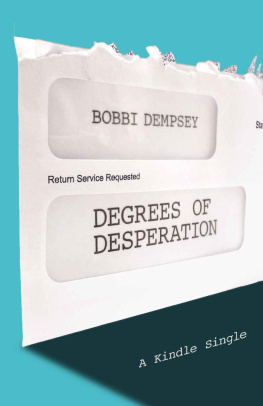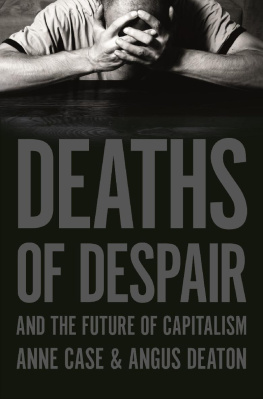Degrees of Desperation
By Bobbi Dempsey
Copyright 2015 by Bobbi Dempsey
What are we going to do now?
A man sat across from me, but I was really asking myself. I was sitting in the financial aid office of my sons collegeone of them in his third year and the other in his secondand had just pleaded for any type of aid that could help me keep them in school. I had only a few hours to come up with a miracle, and I was desperate.
I had been to this office before, and had usually dealt with staff members who seemed sympathetic even though in the end, there was nothing they could ever do to help.
But this guy couldnt even pretend to be interested, let alone sympathetic.
Nope, theres nothing we can do. He was no longer even going through the motions of typing on his computer and had turned away from his computer screen to glance at his cell phone. I got the message loud and clear: We were done here, and he was eager to get rid of me.
I deflated, too drained to even get up and leave.
I flashed back to images of my childhood, when my motherthen a single mom of four, fleeing an abusive husband with a prison recordwould go to social service agencies desperately seeking food or help trying to pay for a place where we could live. I imagined I was now feeling the way my mom had felt thenlike I was begging.
I had come to the financial aid office to plead for some help in the form of any kind of aid they could offer me. My two older sons had nearly perfect GPAs and heavy, demanding course loads. They were, I had assumed, the type of students that schools would be eager to help. These were the types of students we always hear administrators and politicians talking about. I had started college years before but had to drop out for financial reasons, so at that point my sons had the potential to be the first college graduates in our family. But we had a long way to go, and graduation was looking like a very dim prospect at that moment.
Noticing I wasnt making any moves to leave, the financial aid officer attempted a half-hearted suggestion. Maybe there are some family members who could help you out.
A few minutes later, I walked outside, sat on the front steps of the administration building, and started crying.
If this were a movie, this would be the moment when a miracle happenedthe school president would just happen to come upon the scene while giving a tour to wealthy donors eager to find some students upon whom they could shower financial support. Or the homeless man on the corner would turn out to be a millionaire secretly hiding out on campus, trying to choose someone with whom he could share his fortune.
But this wasnt Hollywood, it was real life. So instead I was surrounded by college students who skirted around me, pretending not to notice.
After a few minutes spent on the steps sobbing, I realized I needed to figure out what to do next. Even though I felt physically and mentally drained, I forced myself to get up and head to the parking lot. I got into my old Blazer, the one with the horn and lights that turned on and off by themselves at random times, the one that I had gotten into before dawn that morning to head to the job I had taken to try to help with the tuition bills.
The clock was one of the few things in the car that actually worked, but I kind of wished it didnt. Seeing the digital numbers slowly creep higher made me remember that my time was almost up.
When youre scraping by and living paycheck to paycheckas my husband and I were, on our salaries of 25 to 30 grand a year each at most, to support our family of fivelife seems to be an endless series of ticking clocks that count down to impending crises and impossible financial deadlines. You need to find a way to pay that electric bill before the shutoff notice arrives, for example, or come up with a way to stall that bill collector before the phone rings again. Or scrape up enough change to put at least a little bit of gas in the tank before it falls so far below E that you wont be able to get to work in the morning.
And college bills were no different. There were firm due dates and consequences if things didnt happen by a certain timeconsequences that were now running through my mind as I sat in the Blazer.
If my sons bills werent paid by the end of the day, they would be de-registered, meaning they would be removed from the classes they were already in, ones in which they had already completed assignments and taken exams. Once they were de-registered, it would set off a whole chain of problems and fallout. They wouldnt get credit for any of the work they had done in those classes.
Since the period in which they could add classes had already passed, they would not be able to re-enroll in those courses or take any other this semester, even if we found a way to quickly pay up and settle their bill.
They would probably get incompletes for all their classes, which would totally destroy their GPA and would likely result in being placed on academic probation. Because they had already attended several weeks of classes, we might actually still owe payment for those classes, even once theyre de-registered.
In addition, they would fail to meet satisfactory academic progressthe standard used to determine financial aid eligibility. By failing to meet SAP, they would lose future eligibility for any financial aid for up to a year once they had managed to complete classes (for which, of course, we would have to pay the full amount, since they would then not be eligible for any aid).
They would also have to vacate their dorm rooms immediately because they would not be considered current students. However, I assumed they would still owe payment for the housing cost (likely full payment for the entire semester), since they had already used the dorm rooms for a few weeks up until that point.
Bottom line: It wasnt as simple as putting the classes on hold and jumping back into them next semester.
Ironically, it can actually end up costing you quite a bit of money if you get removed from classes for an inability to pay.
No, letting my sons get kicked out of school just because of our financial situation wasnt something I could let happen. It had taken nearly everything we had to get them this far, and I knew if we stopped now, they might never get back on track.
This was their way out. I come from a lineage of poverty that goes back several generations. I grew up on welfare (bouncing around between New York City, Buffalo, and a few Pennsylvania towns) and stayed on it until high school graduation. My mother worked a series of menial, low-paying jobs but has never owned a home, a car, or anything else of value. My father was an abusive heroin dealer who had done stints on Rikers Island and had disappeared by the time I finished grade school. When I started high school, I had already moved more than 70 times.
I was the first one in my immediate family to own a carI bought a Pinto with a bad transmission for $500 a few months after graduating from high school. Even though I was working two jobs, it took me quite a while to save up that much, since I was already living on my own at that time. In short, I was starting with nothing. I also had no reference point of what normal financial management looked like, so I had no clue what I was doing in that regard. In getting my kids through collegeas with everything elseI was just figuring it out as I went along.
Though I am by nature an optimistic person, I have also been forced to become a realist. When it comes to money and trying to work your way up and out of poverty, I have had to face a harsh and painful truth. The idea that you will get ahead and achieve the American Dream if you just work hard enough, do everything right, and follow the rules isas many people have discovereda total lie. Yes, some people do make it, often through a combination of luck, good timing, determination, and a host of other factors all lining up at the same time. But the idea that sheer hard work alone is a guaranteed road to wealth and success is a fantasy, at least when you start out at such a huge financial disadvantage.
Next page










